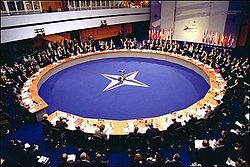A request that this article title be changed to 2002 NATO summit is under discussion . Please do not move this article until the discussion is closed. |
This article needs additional citations for verification .(October 2016) |
| Prague summit | |
|---|---|
 2002 NATO Summit | |
| Host country | Czech Republic |
| Dates | 21–22 November 2002 |
| Venue(s) | Prague Congress Center |
| Follows | 2002 Rome summit |
| Precedes | 2004 Istanbul summit |
| Website | www |
The 2002 Prague summit was the 17th NATO summit held at the Prague Congress Centre where the heads of state and government of the NATO member states met. Seven states at the summit were invited there to begin accession talks with NATO: Bulgaria, Estonia, Latvia, Lithuania, Romania, Slovakia and Slovenia. NATO's post-Cold War Open Door Policy was also reaffirmed at the meeting. A NATO Response Force was considered and planned, a force that was officially declared ready at the 2006 Riga summit.
At a press conference, then-President of the United States George W. Bush declared that the US would "disarm" Saddam Hussein together with a "coalition of the willing". [1] [2]